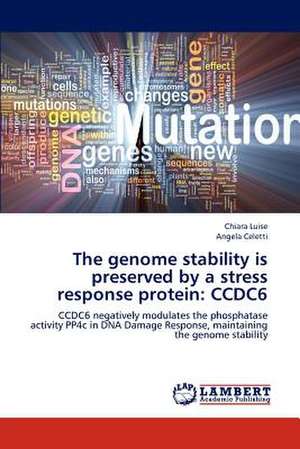The genome stability is preserved by a stress response protein: CCDC6
Autor Chiara Luise, Angela Celettien Limba Engleză Paperback – 5 iul 2012
Preț: 323.03 lei
Nou
Puncte Express: 485
Preț estimativ în valută:
61.81€ • 63.77$ • 51.58£
61.81€ • 63.77$ • 51.58£
Carte tipărită la comandă
Livrare economică 26 martie-09 aprilie
Preluare comenzi: 021 569.72.76
Specificații
ISBN-13: 9783659143533
ISBN-10: 3659143537
Pagini: 80
Dimensiuni: 152 x 229 x 5 mm
Greutate: 0.13 kg
Editura: LAP LAMBERT ACADEMIC PUBLISHING AG & CO KG
Colecția LAP Lambert Academic Publishing
ISBN-10: 3659143537
Pagini: 80
Dimensiuni: 152 x 229 x 5 mm
Greutate: 0.13 kg
Editura: LAP LAMBERT ACADEMIC PUBLISHING AG & CO KG
Colecția LAP Lambert Academic Publishing
Notă biografică
Chiara Luise at present is working as a Post-doc in Naples, IEOS Institute of Endocrinology and Experimental Oncology "G. Salvatore", ITALY. She took her Biotechnology degree and PhD degree in Pathology and Molecular Physiopathology from University of Naples "Federico II", Department of Cell and Molecular Biology and Pathology "L. Califano".




